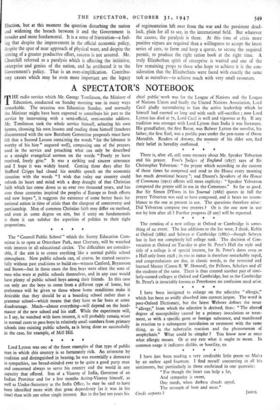* * * * Lord Lytton was one of the
finest examples of that type of public man in which this country is so fortunately rich. An aristocrat by tradition and distinguished in bearing, he was essentially a democrat in sympathies, too broad-minded ever to be quite a good party man and concerned always to serve his country and the world in any oapacity that offered. Son of a Viceroy of India, Governor of an Indian Province and for a few months Acting-Viceroy himself, as well as Under-Secretary at the India Office, he may be said to have been identified more with that great dependency (as it was in his time) than with any other single interest. But in the last ten years his
chief public work was for the League of Nations and the League of Nations Union and finally the United Nations Association, Lord Cecil gladly surrendering to him the active leadership which he himself had exerted so long and with such self-sacrifice ; now Lord Lytton has died at 71, Lord Cecil is well and vigorous at 83. If any tradition was stronger with Lord Lytton than India it was literature. His grandfather, the first Baron, was Bulwer Lytton the novelist, his father, the first Earl, was a prolific poet under the pen-name of Owen Meredith. Readers of Antony, the memoir of his elder son, find their belief in heredity confirmed.
• * * •


































 Previous page
Previous page